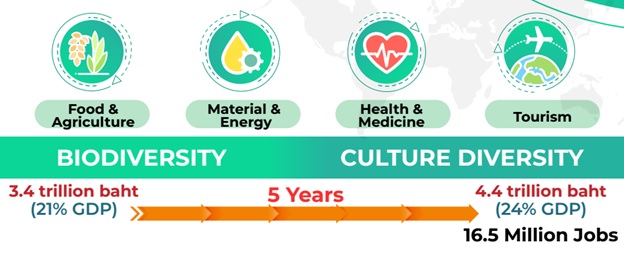The four target industries currently have a combined economic value of 3.4 trillion THB (21% of GDP). BCG model has a potential to increase the economic value to 4.4 trillion THB (24% of GDP) in the next five years. The BCG model can create value addition as follows:

- Food and Agriculture. The value of this sector can be multiplied with product diversification, product differentiation, high-value and premium-quality products and services, waste reduction, resource- and land-use efficiency improvement. This strategy can be enabled by R&D and technologies such as customer behavior analytics, optimized waste production, smart farming technologies, traceability, food and product safety, as well as the development of high-value and novel food products such as food for special groups of people (patients and the elderly, for example) and functional ingredients.
- Medical and Wellness. The strategy includes intensive capacity building in technology and human capital in R&D and production technology for vaccines, biopharmaceuticals and medical devices, as well as clinical research and product registration of pharmaceuticals and medical devices, all in support of Thailand’s healthcare policy of promoting preventive medicine and precision medicine. Platforms to facilitate the utilization of genetic data as well as clinical research among involved parties including researchers, industry and regulatory bodies will also be established.
- Bioenergy, Biomaterial and Biochemical. This sector has high potential growth due to the government policy setting a renewable energy target of 30% of total final energy consumption by 2036. The energy sector can benefit from advanced technology in energy produced from renewable sources such as refuse derived fuel (RDF) and biogas, as well as the establishment of community-based power plants (CBP) with a distributed energy resources (DERs) system using renewable energy sources, including biomass and biogas and connected through blockchain-enabled smart microgrids. This vision will require intensive research in energy storage systems. As for the materials and biochemical sector, cutting-edge technologies will be developed and employed to convert biomass and agricultural by-products to high-value commodities such as bioplastics, fibers and pharmaceuticals.
- Tourism and Creative Economy. Thai tourism industry can benefit from the policy to promote secondary cities and communities as new tourist destinations. Technology and innovation will be applied to create and upgrade infrastructure and a digital platform to improve tourists’ convenience and experience and advance the industry to high-quality tourism. Science and technology will be employed to define national guidelines for tourism, e.g. carrying capacity, support sustainable tourism standard system and conserve and rehabilitate the environment. Under the creative economy concept, tourism can be linked to other service industries to target niche markets such as wellness tourism, culinary tourism, eco-tourism, cultural tourism and sports tourism.
